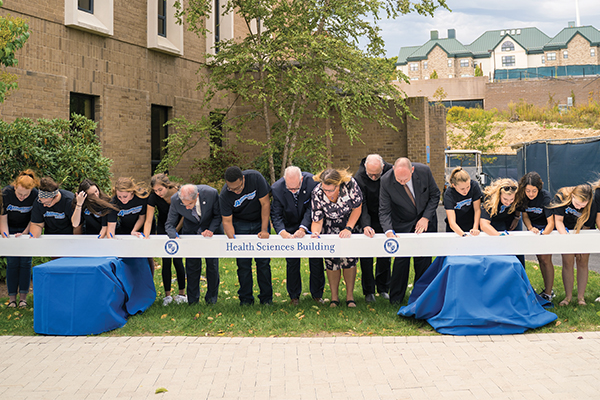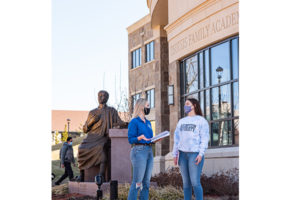
The medical field is changing. No longer are doctors the sole providers of a patient’s care; physician assistants (PAs) are becoming increasingly present in hospitals, doctor offices, and every aspect of care.
“The practice rules are changing,” said Michael Whitehead, DHSc, PA-C, DFAAPA, dean of the School of Health Professions and founding director of Assumption’s new physician assistant studies program. “PAs are part of the healthcare team, working with physicians and the rest of the healthcare providers. It is a collaborative agreement between doctors and PAs.”
According to the U.S. Bureau of Labor Statistics, the demand for physician assistants is predicted to increase by 37 percent between now and 2026, significantly faster than the average for other professions. The American Academy of Physician Assistants states that “the demand for PAs is so high that three quarters of PAs receive multiple job offers upon graduation.” This demand, and the parallels of the field with Assumption’s mission, influenced Assumption to create a program. The 28-month, 113-credit Master of Science degree program (completed over seven consecutive semesters) will provide the breadth and depth of education required of today’s practitioners and a rich learning experience for Assumption PA students.
“The Catholic principles will play a role in how the program is conducted,” said Dean Whitehead. “We want students to feel that there is an overarching glow to the program of empathy, compassion, and dignity of every human being. That’s been a belief of mine since I started practicing 35 years ago.” Dean Whitehead previously worked at Wingate University and MCPHS University and is no stranger to building a program from the ground up; he did the same at Clarkson University for their physician assistant program.
“In some programs, often the medicine and the science become 90 percent of the message,” he said. “While it is a significant part of the message that we will certainly deliver, our overarching theme is compassion, kindness, and reminding the students of that on a constant basis. We’re not taking care of an illness; we’re taking care of a patient who has an illness, and there are many layers of a human being that we have to appreciate.
“The broad-based liberal arts education makes you a better grounded human being,” continued Dean Whitehead. “Medicine isn’t just about the science. It’s about the things you know and the way you react to them. The education you are getting here is different than that of other colleges. The best humans make the best providers.”
The Assumption Master of Science in Physician Assistant Studies is currently in the accreditation process and anticipates matriculating its first class in January 2021. The program will also offer Assumption students (beginning with the Class of 2024) the opportunity to enroll in a dual degree program in which they can earn their bachelor’s degree and the master’s in physician assistant studies – one of only three programs of its kind in Massachusetts.
Physician assistant and nursing students will be the first to utilize the new state-of-the-art, 41,000-square-foot Health Sciences building, currently under construction between the Emmanuel d’Alzon Library and the Hagan Campus Center.
In addition to nursing facilities, the building features four classrooms of varying sizes, each fully equipped with a recording system for simulations, and, on the physician assistant floor, a practice lab with 11 exam tables, two simulation labs, and four objective structured clinical examination rooms where live “patient-actors” will help teach students how to take a medical history, diagnose a patient, and perform a physical exam.
“We are building a program that will make us proud and will be representative of Assumption’s standing in the community,” said Dean Whitehead. “Students will want to come here, healthcare systems will want to hire them, and patients will want to be seen by an Assumption PA. They will be professional, compassionate, kind, and reflective of the principles of the institution.”


